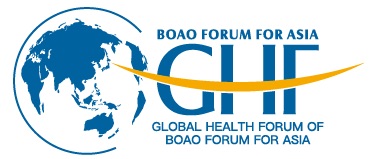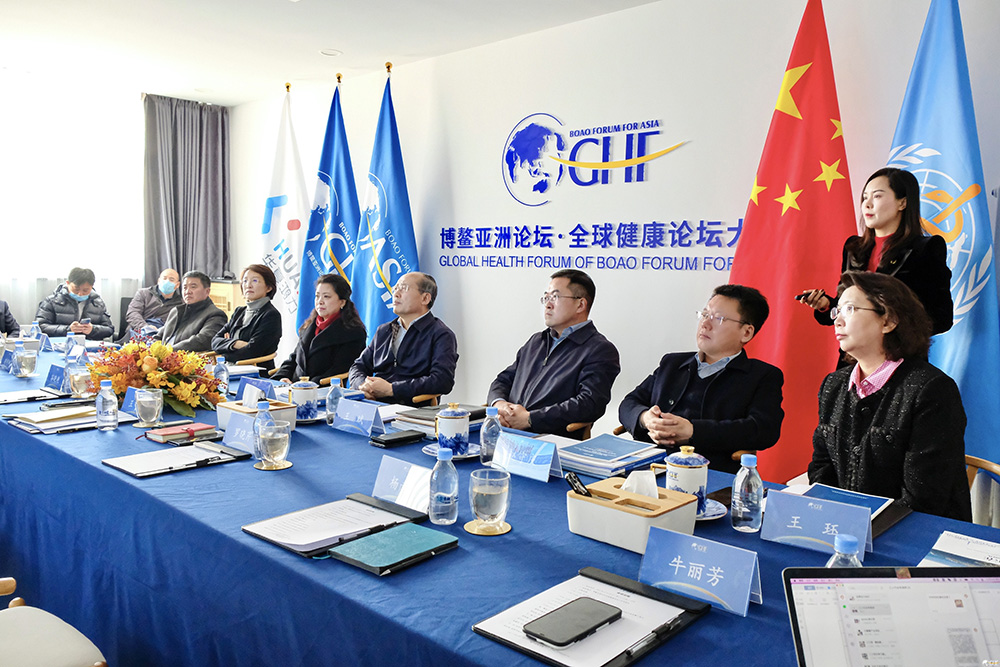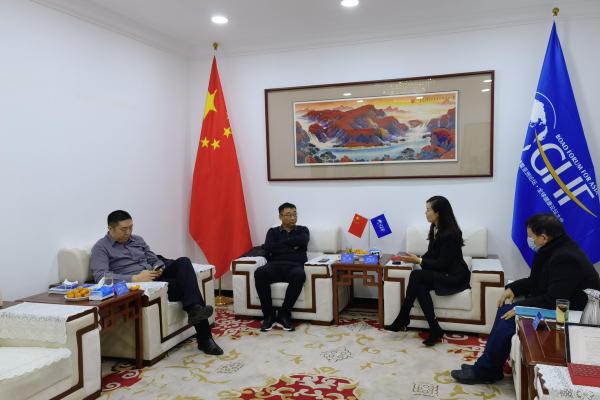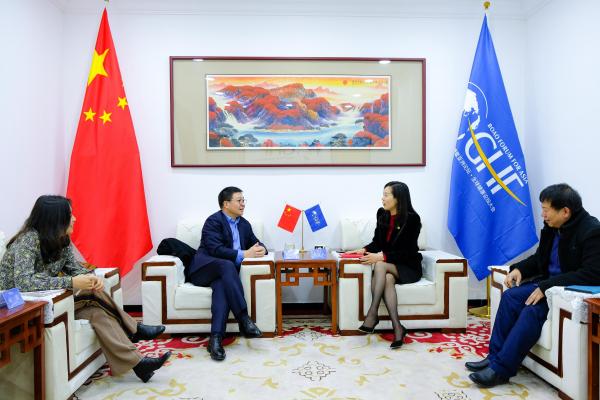
On the morning of April 18, the Boao Forum for Asia (BFA) held the first press conference for its Annual Conference 2021 in the BFA International Conference Center at Boao, Hainan. At this event, BFA Secretary General Li Baodong extended a welcome to more than 2,600 representatives and 1,200 journalists from over 60 countries and regions to attend the annual conference, which is also part of BFA’s celebrations for its 20th anniversary. During the press conference, Secretary General Li Baodong also released two flagship reports of Annual Conference 2021, namely the Asian Economic Outlook and Integration Progress Annual Report 2021 and Sustainable Development: Asia and the World Annual Report 2021.
In spite of the impact of COVID-19, Li said, the annual conference this year will welcome a prominent lineup of 40 incumbent and former state and government leaders, 74 ministers and former government officials, 29 heads of international and regional organizations and 27 foreign diplomats based in China. Moreover, nearly 100 business leaders from Fortune 500 companies and other renowned enterprises have been invited to attend the discussions together with a large number of experts and scholars. Together, they will provide vital “Asian perspectives” on how to promote world growth and enhance global governance in the post-pandemic era.

Li Baodong said that the globally pervasive pandemic again highlights the significance of sustainable development for human society. The two flagship annual reports, Asian Economic Outlook and Integration Progress Annual Report 2021 and Sustainable Development: Asia and the World Annual Report 2021, released on the 20th anniversary of BFA, is both a continuation of the past and an innovation aimed for the future. Building on the report series in the 20 years of BFA, the Asian Economic Outlook and Integration Progress report reflects BFA’s focus on Asia and explores hot-button issues with regard to Asian economic growth and regional integration. The Sustainable Development: Asia and the World report looks at key issues concerning sustainable development of Asia and beyond, reflects BFA’s mission for shaping a better future for the world, and inspires all the stakeholders to build broader consensus, launch more diversified initiatives and take more determined actions.
According to Li, the Asian Economic Outlook and Integration Progress report provides a panoramic scan of the prospects of Asian economic growth and regional integration process amid the COVID-19 pandemic, as well as a regional and sectoral analysis. The report also addresses four major critical issues—the post-coronavirus transformation of digital economy, challenges associated with debt sustainability, Asian regional trade arrangements and the high-quality development of the Belt and Road Initiative in the context of COVID-19. The Sustainable Development: Asia and the World report focuses on sustainable economic recovery amid the great reset and explores how to find new paradigms for sustainable future-oriented growth to realize UN Secretary General Antonio Guterres’ goal of “building back better”, instead of following the business-as-usual approach.
Li pointed out that due to COVID-19, the Asian economy shrank for the first time last year in six decades, but Asia as a whole demonstrated great resilience. China was the only major economy that grew in 2020. As a pillar of multilateralism, Asia has been playing critical roles in fighting against COVID-19, stabilizing industry value and supply chains and promoting trade and investment. China has also been playing a pivotal role in this process.
He highlighted that the China-led Asian market will further expand to create massive demand for the world economy. The further integration of trade in goods and services, direct investments and financial markets and deepening connectivity within Asia will continue as a mega trend. With Asia leading the world to bring COVID-19 under control and reopen its economy, it is estimated that Asian economic growth will accelerate at a pace above 6.5% in 2021.
Li Baodong said that the alignment of regional and global connectivity initiatives—including China’s Belt and Road Initiative, the Master Plan on ASEAN Connectivity 2025 and the Eurasian Economic Union—will have significant implications for regional trade cooperation, post-pandemic economic recovery and development. The entry into force and implementation of the Regional Comprehensive Economic Partnership (RCEP) that was signed in last November, alongside other regional free trade agreements like the Comprehensive and Progressive Agreement for Trans-Pacific Partnership (CPTPP), will facilitate and liberalize trade and investment in Asia on different dimensions and at various levels. However, it must be noted that the COVID-19 pandemic remains the major variable factor that will directly affect Asian economic performance. The pandemic situation in Europe and America, their pace of economic recovery and economic policies will also have a tremendous impact on Asian recovery.

Li said that Asian countries’ vigorous pursuit of the UN Sustainable Development Agenda, unwavering commitment to sustainable development and their willingness to sacrifice their short-term gains have demonstrated their courage, wisdom and ownership. As early as in 2005, Chinese President Xi Jinping put forward the idea that “lucid waters and lush mountains are invaluable assets”. This past March, the National People’s Congress of China passed the 14th Five-Year Plan (2021-2025) for National Economic and Social Development and the Long-Range Objectives Through the Year 2035, showing China’s great determination to accelerate green transformation.
Li emphasized that in view of COVID-19, health, infrastructure, green and digital deficits have become major hindrances to Asian’s sustainable recovery. Addressing the deficits in these four areas in a coordinated way will unleash enormous potential and help achieve multiple sustainable development goals. The leaders of China, Japan and ROK have successively announced their carbon neutrality goals. Against the headwinds of the pandemic, Asian countries are forcefully pressing ahead with the digital transformation of their economies. At the same time, technology innovation will also create limitless potential for Asian development. The leading role of governments and the engagement of companies have brought about transformative changes in Asia. This is a sustainable and encouraging trend. BFA members and partners have also been contributing to sustainable development goals by transitioning towards new energy, new infrastructure, new retail and low-carbon sectors.
We emphasized that in today’s world, upholding multilateralism is the key to addressing the global development deficit and restore sustainable recovery. Countries should work together to accelerate vaccination, promote equitable access to vaccines and create a mechanism for mutual recognition of vaccination digital certificates, so as to lay a solid foundation for economic recovery; to advance efforts to implement the UN Framework Convention on Climate Change and the Paris Agreement, so that signatory countries will achieve their targets in self-determined contributions by 2030; to help align regional initiatives like the Belt and Road Initiative with international development agendas for coordinated development; to facilitate the implementation of various free trade agreements and the improvement of standards; to encourage technology innovation and cooperation to unleash the potential of digital economy; and to enhance the role of global governance platforms and international institutions.
Li concluded that as a major engine for global sustainable recovery, Asia will join hands with other countries and territories in fighting COVID-19, tackling the development deficit and promoting economic integration. It will also strengthen cooperation and increase good practice sharing with developing countries in other continents to promote capacity building. Moreover, Asia will also actively involve itself in the reform of international rules and order to advance progress in the formation of a human community with a shared future.
At the press conference, several guests jointly introduced the key insights of the flagship reports. They included: Zhang Yuyan, Director of the Institute of World Economics and Politics, the Chinese Academy of Social Sciences (CASS) and CASS Member; Lin Guijun, former Vice President of the University of International Business and Economics; Liang Ziqian, Deputy Director of the Central Asia Regional Economic Cooperation Institute; Rosa Yang, Managing Partner of Deloitte China; and Cao Li, Vice President of the BFA Academy.




 News
News
 Partner application
Partner application Download
Download Hot News
Hot News









